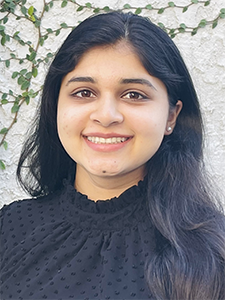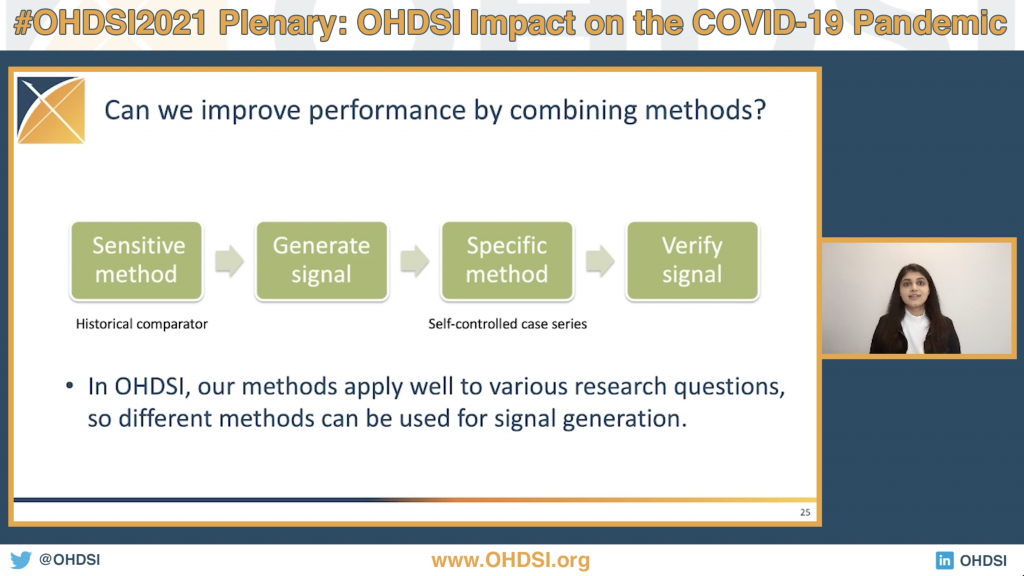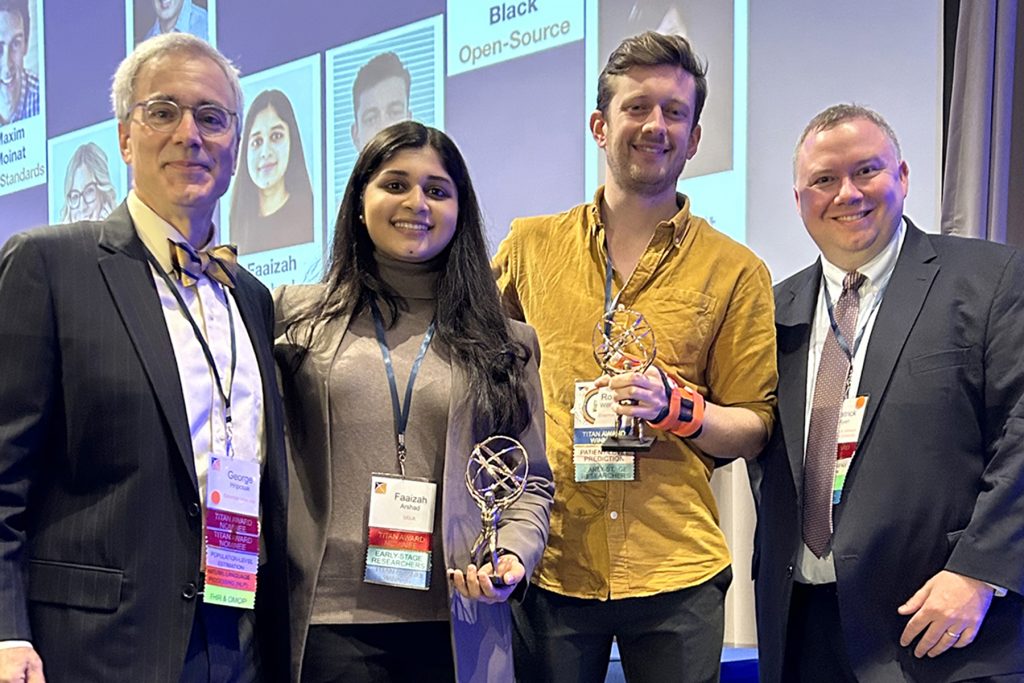- Who We Are
- Updates & News
- Standards
- Software Tools
- Network Studies
- Community Forums
- Education
- New To OHDSI?
- Community Calls
- Past Events
- 2024 India Symposium
- 2024 Europe Symposium
- 2024 Thailand Tutorial
- 2024 Japan Tutorial
- 2024 DevCon
- 2024 Phenotype Phebruary
- 2023 Global Symposium
- 2023 APAC Symposium
- 2023 Europe Symposium
- 2023 SOS Challenge
- 2023 DevCon
- 2023 Phenotype Phebruary
- 2022 Global Symposium
- 2021 Global Symposium
- 2020 Global Symposium
- ALL Past OHDSI Events
- Workgroups
- 2024 ‘Our Journey’ Annual Report
- Current OHDSI Events
- Support & Sponsorship
- CBER Best Seminars
- 2024 Global Symposium
- 2024 APAC Symposium
- Github
- YouTube
- Newsletters
Collaborator Spotlight: Faaizah Arshad
Previous Collaborator Spotlights
Faaizah Arshad is a psychology major at UCLA who has already taken a strong role within the OHDSI community. She became the first undergraduate to take part in a symposium plenary whenn she presented on ‘The EUMAEUS project: Applying methods sequentially’ during the 2021 Global Symposium.
She and Ross Williams co-founded the Early-Stage Researchers workgroup in 2021 to create an inviting venue for junior OHDSI community members early in their careers to navigate OHDSI’s resources, ask questions, present their research, find mentorship through networking, and seek insight on their career trajectories. Currently, the workgroup hosts a Career Speaker Series each month, and has led “Meet The Mentors” events at the European and Global Symposiums.
Arshad was honored with the Titan Award for Community Support in 2021. In the latest collaborator spotlight, she discusses how OHDSI has impacted her undergraduate education, how she was able to

make such an impact so early in her journey in observational research, and why she believes other junior researchers can make an impact in OHDSI.
How did your interest in healthcare research begin, and what is your focus/major at UCLA?
I always appreciated science and was definitely lucky to have science teachers who were so enthusiastic that it shaped my curiosity. In 6th grade, I was gifted The Immortal Life of Henrietta Lacks, which is a book encompassing ethics and intersectionality between race, socioeconomics, and medicine. That was one of my first exposures to the beauty of research and science. It was also an eye-opening account of challenges and outcomes in healthcare decision-making. Overtime, I wanted to see medicine inside the hospital, at an individual level. Through volunteering with patients and being around my grandparents who developed health complications, I found I enjoyed having one-on-one conversations at patients’ bedsides.
When I started college at UCLA, a research-oriented institution, I felt there was no better time to take my knowledge a step further by exploring an interesting subject while learning alongside experts. Healthcare research allows me to stay updated on the latest discoveries. Even though research can be daunting, I’m really glad and grateful that I stepped foot into it.
I’m majoring in psychology at UCLA. Psychology fascinates me because it includes both the heavy science of the brain, behavior, and development, but also delves into the humanities of how social factors can challenge people’s ability to cope with their health. Studying psychology has taught me to be a better listener and to understand how people’s identities are multifaceted. I believe this is relevant in medicine where providers should step into others’ shoes, be compassionate to others’ decisions, and be culturally aware to individualize care.
It has been rare in the community for undergraduates to make such a large impact, so how did you find your way to OHDSI, and what inspired you to be so active in the research?
I was fortunate to come across OHDSI. I started learning R programming in college and wanted to apply it to something clinically related. I read about Marc Suchard’s work at the UCLA Fielding School of Public Health and expressed my interest in his research. Eventually, I was attending every Community Call and learning about public health worldwide. There’s a quote I really like from Steve Jobs: “You have to be burning with an idea, or a problem, or a wrong that you want to right. If you’re not passionate enough from the start, you’ll never stick it out.” This quote sums up one of the reasons why I am continuously inspired to be in OHDSI: I have questions about health/disease that I want to see answered. Learning from a community that is tackling these questions hands-on is very exciting and inspiring. I feel lucky to be involved in this effort.
How has being part of the OHDSI community impacted your undergraduate education?
Immensely. Research allows me to exercise clinical thinking skills in ways college classes don’t. Research gives you a broader and deeper understanding of any field. Especially in OHDSI, research is interdisciplinary, so you are not only learning the science underlying certain diseases, but also how to code with data, how to standardize and improve quality of data, how to do predictive modeling and estimation, how to characterize populations, how to reproduce evidence. You’re developing a skill set. OHDSI changed the way I think about participants in healthcare: I’ve gained an overwhelming appreciation for everyone’s expertise. Sure, we can use our own data to improve health, but why not do it together, with 3000+ collaborators and endless opportunities?
 You discussed the EUMAEUS (Evaluating Use of Methods for Adverse Event Under Surveillance) Project as part of the 2021 Global Symposium plenary. How critical was it to not only study vaccine safety/efficiency, but also to study the methods of how we were evaluating this? What stood out to you about this work?
You discussed the EUMAEUS (Evaluating Use of Methods for Adverse Event Under Surveillance) Project as part of the 2021 Global Symposium plenary. How critical was it to not only study vaccine safety/efficiency, but also to study the methods of how we were evaluating this? What stood out to you about this work?
Very critical. It feels rewarding to have been part of a team that was tackling vaccine surveillance at a time that when we arguably needed to study it most— during the COVID-19 pandemic. We were generating influential conversations in real time. What stood out to me was how important it is to verify existing scientific methods and question whether there are better practices. And that’s what we found— current vaccine surveillance methods can be improved. I hope this conversation continues to inspire health research with agencies like the FDA and CDC.
You and Ross Williams initiated the Early-Stage Researcher Workgroup to try and bring more junior researchers into OHDSI. What has the experience been like over the first year, and why do you feel like younger researchers can find a home in OHDSI?
Co-leading the Early-Stage Researchers Workgroup has been one of my favorite parts of OHDSI because it’s an inviting place for junior researchers, like myself, to ask questions and learn from each other. I have learned a lot from Ross Williams about resources in OHDSI. We are creating our own dream career content through the monthly speaker events. The working group has grown drastically over the past year. Anyone who is new to OHDSI should definitely join!
 You were honored with a 2021 Titan Award for community support. What did that mean to you, and while you clearly inspire the community, how has OHDSI inspired/impacted your experience at UCLA?
You were honored with a 2021 Titan Award for community support. What did that mean to you, and while you clearly inspire the community, how has OHDSI inspired/impacted your experience at UCLA?
It was a huge, tremendous honor! Several people in OHDSI are Titans and mentors to me because I learn from their work every day. OHDSI has been a highlight these past few years. I have learned the importance of collaboration, community, scientific integrity, and thinking big. I hope to carry these lessons into my career.
What are your hobbies?
I’m a long-time avid swimmer and I love spending time outdoors, especially hiking.
